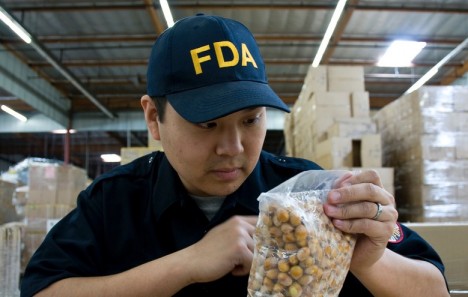
United States government work
If you’re fairly itching to send your Congressperson an angry email just on principle (the principle being the current unwillingness of Congress to accomplish absolutely anything), but you need a specific issue to use as a hook, let me humbly suggest something along the lines of the following.
Dear (name of Representative who has been a waste of salary since 2004):
Wise up and fully fund the damn Food Safety Modernization Act! Now!
Cordially, (your name here).
In case you happen to be the picky type who wants to know what a government program is and does before you begin banging the drum on its behalf, here’s what we’re talking about. The Food Safety Modernization Act was passed by Congress in 2010 in response to a growing incidence of illnesses caused by tainted food products, a pattern that was becoming literally criminal. The Peanut Corporation of America, for example, had shipped an entire factory run of products nationwide that it not only knew to be contaminated with salmonella, but included with the products bogus test results, actually from previous, untainted shipments, attesting to their safety.
The company is now out of business, which is cold comfort to the over 700 people who were stricken with illness in 46 states, but the silver lining is that, by sparking the biggest food recall in American history, it provoked Congress into passing the Food Safety Modernization Act.
The FSMA was heralded as providing the Food and Drug Administration with sweeping powers to head off food-borne illness outbreaks through increased food inspections, monitoring the quality of imported food products, providing backup for state inspection programs, the power to issue mandatory food recalls, and other regulatory controls. The result would be a much improved system guaranteeing food safety in the U.S.
And how successful has the FSMA been, some five years later? In a nutshell, about as successful as “Just Say No.” Consider the following gloomy statistics.
-
The FSMA notwithstanding, illnesses from contaminated food products continue to rise, afflicting almost 48 million Americans a year and killing some 3,000 of them.
-
According to several federal agency reports issued just three months ago, various beef, chicken, dairy, vegetable and fruit product samples are still found to contain such pathogens as E. coli, campylobacter, listeria and salmonella. The last two bacteria alone are responsible for 260 and 380 deaths per year respectively, while salmonella hospitalizes another 20,000 or so annually. (CalorieLab’s Sarah E. White has the gruesome details on these and more foodborne illnesses.)
-
Just last month, a batch of Blue Bell dairy products contaminated with potentially lethal listeria bacteria were recalled when at least three people in the Midwest died after consuming them.
-
This may not be surprising given the results of a GAO study which found that the FDA had not only failed to meet its goal of inspecting 4,800 food production facilities per year, but hugely so, barely managing to inspect 1,300.
Follow the lack-of-money
What, you may well ask, is the freaking problem here? Harken to the analysis of the FDA’s deputy commissioner for food products, Michael R. Taylor: “The problem is we don’t have the money.”
Before you write this off a typical bureaucratic “throw dollars at it” response to a problem, take note that the Congressional Budget Office, not the FDA, calculated back in 2011 that it would cost $580 million over five years to make the FSMA fully operational and effective. The response of Congress was to shrug off the report and, at the urging of food industry lobbyists, to grant it only a fraction of the needed $116 million a year. Last year, for example, it appropriated just $27.5 million to fund the act.
Starved for financial resources, the FDA has been simply unable to modernize its inspection program and hire the 2,000 inspectors and other personnel required to implement it. Congressional opponents of increased funding have stiffed the agency by invoking the usual “overburdened taxpayers” cant, but the FDA has proposed that the funding shortfall be made up from user fees charged to food producers, essentially requiring the food industry to help foot the bill for its own product safety measures. In fact, the FDA has made this proposal for each of the past five years, and each time intense industry lobbying has left it dead on arrival in the halls of Congress.
The end result of all this is a feel-good piece of five-year-old legislation that cannot be put into actual practice. As one consumer group lobbyist noted, without the funds needed to support the FSMA, “the law is not going to be worth the paper it’s written on.” Which is precisely the goal of the industry.
Let us close with two more salient observations. First, from House Appropriations Committee chairman Harold Rogers (R–KY), that the FDA’s request for $100 million this year to implement the FSMA “will be tough to swallow” for his fellow Congresspersons. And second, from Representative Rosa DeLauro (D–CT), a co-author of the act: “If we keep shortchanging the FDA, it will continue to cost us billions of dollars a year to deal with food-borne illness.”
Apparently, Rep. Rogers and his anti-regulation cohort have no trouble swallowing that. If you do, hey: write your Congressperson. But, given that on the day after last week’s deadly Amtrak disaster a Congressional committee voted to cut Amtrak funding by 20 percent, don’t get your hopes up.

By Robert S. Wieder, CalorieLab’s Senior Health Columnist since 2006. Author of several books, including 115 Reasons Why It’s Not Your Fault You’re Fat, Bob wrote for numerous national magazines after starting out as editor of the UC Berkeley humor magazine the California Pelican. He also put in a stint as a San Francisco-area stand-up comic.
How Congress Guts Our Food Safety Laws is a post from:
SOURCE: – Read entire story here.



